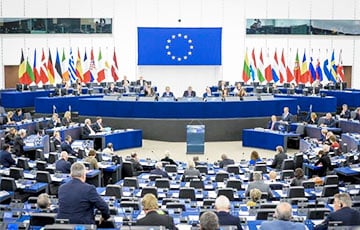The European Parliament: Lukashenka’s Regime Is at Rock Bottom
22- 21.10.2020, 7:43
- 77,806

MEPs offer new measures to support democracy in Belarus.
The European Parliament has discussed a report on relations with Belarus, reports dw.com.
The European Union considers that the Belarusian authorities are feeling increasingly desperate. The EU High Representative for Foreign Affairs, Josep Borrell, stated that referring to the readiness of Belarusian security forces to use military weapons to suppress protests. "These signals cause great concern. However, it also demonstrates the desperation of the authorities," Borrell said. He believes that the patience of people in Belarus is coming to an end. The "people's ultimatum" issued by the leader of the Belarusian opposition, Sviatlana Tsikhanouskaya, indicates it.
Recipe for EU-Belarus relations
Borrell spoke on Tuesday, October 20, at the meeting of the European Parliament on relations with Belarus. The author of the report - Lithuanian deputy from Renew Europe, Petras Auštrevičius, - reminded that the protests in Belarus had been ongoing for more than 70 days.
"The Belarusians are subjected to illegal arrests, humiliation, attacks and injuries. Law enforcement bodies that aim to protect people, do this... One person, Aliaksandr Lukashenka, is to blame for this. He puts his interests first, neglecting the future of the Belarusian people and the independence of Belarus," said Auštrevičius. According to him, the recipe the EU should turn to is solidarity, support and sanctions.
Anna Fotyga, a representative of European Conservatives and Reformists, considers this approach correct. "For more than 70 days Belarusians have been decisive in their protest against the usurper president, who uses all the power of the country against the civilian population," she said and called for the expansion of sanctions, as well as increased support for people in Belarus.
The Croatian social democrat Tonino Picula, supported the idea to add new names to the sanctions list, although his faction has the rather reserved attitude towards sanctions. He also stressed that the EU should assist victims of repressions in Belarus.
What can the European Parliament do for Belarus in practice?
"This is the fourth time we have had a debate (on Belarus - editor's note). While we are debating, those who dare to speak out against injustice and violence are kidnapped, detained, jailed, beaten, tortured and raped... It's enough of debate, let's get down to deeds," called German MEP Viola von Cramon of the Green Faction. In particular, she proposed to add to the sanctions list all those who fulfil illegal orders of Lukashenka, as well as to provide Schengen visas and the opportunity to work in the EU for those who are persecuted in Belarus.
"Once all cruel regimes fall. Lukashenka's dictatorship is no exception. We must prepare for a peaceful transfer of power and already now promise financial assistance to the democratic government after Lukashenka's resignation," von Cramon said.
The European Parliament has no direct influence on the development of the EU foreign policy. But the Lithuanian MEP of the largest faction - the European People's Party, Andrius Kubilius - knows what the Parliament can do. One should create a mission of former presidents and prime ministers, following the example of the mission of former Polish President Aleksander Kwaśniewski and former European Parliament Speaker Pat Cox. The European Parliament created such a mission in 2012 to monitor politically motivated criminal cases in Ukraine, in particular against former Prime Minister Yulia Tymoshenko.
Another proposal of Kubilius is to create a special centre for 'international investigation of riot police crimes". It would register violations and provide legal assistance to victims.
Borrell: A subscriber in Minsk is not available
Almost all of the MEPs who delivered their speeches expressed their support for the report.
At the end of the debate, Borrell stressed that the only way out was to hold new, fair and fair elections. It is the official position of the European Union, agreed by the foreign ministers a week earlier.
Borrell recalled that the EU had not recognized the results of the August 9 elections. Addressing Lukashenka in absentia, Borrell said: "You have no democratic legitimacy, we do not recognize you as a legitimate president of Belarus".
The head of the EU diplomacy added that he supported the OSCE proposal to mediate between Lukashenka and the opposition. But he considers the chances of such a dialogue are slim: "I am not saying they do not exist, but they are slim".
On October 9 Borrell spoke on the phone with the head of Belarusian Foreign Ministry Vladimir Makei. However, Minsk does not keep in touch with Brussels. "Unfortunately, I have to say that the Belarusian authorities do not reply at all. As they say, the subscriber is not available," said Borrell.








